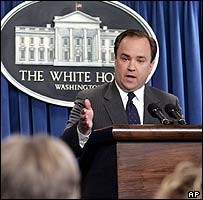Wanted: A Communicator to Non-Communicate
 Josh Marshall asked an interesting question last week, one which I myself was asking: "Does it strike anyone else as odd that the White House tossed [press secretary Scott] McClellan out the window without having a replacement ready to announce?"
Josh Marshall asked an interesting question last week, one which I myself was asking: "Does it strike anyone else as odd that the White House tossed [press secretary Scott] McClellan out the window without having a replacement ready to announce?"
For the most part, this administration -- as soon as it announced that a major figure is leaving -- has had a successor waiting to take the stage. So, I find it extremely interesting that the position that serves to communicate most with the American public is the one they're now perhaps scrambling to replace.
But I can see why many might be hesitant to take on this role.
Many in the PR profesion -- of which I am a part -- see the White House press secretary role as a dream job, one we would ultimately love to have (even though we may not have the right skillset for the job). Oh, how we all wish to be behind that podium, to be a real-life version of C.J. Cregg of "The West Wing." This is one of the pre-eminent jobs, if not the most, in the PR industry, and you can pretty much write your own ticket once your tenure ends.
But would any of us take the open role of spokesperson, as currently envisioned? My sense would be that most PR pros would pass on the opportunity if this were something listed on Monster.com with a 'Company Confidential' tag, because it is counter to what the majority of us do. Can you envision that listing? I'm sure it would have some verbiage about not being in the loop and robotically giving out rote non-answers to hungry members of the press.
Why would I say this? Jay Rosen has nailed it perfectly in his most recent entry over at PressThink in how this White House communications office operates: McClellan was a cog in a machine for making the executive power more opaque, and the presidency itself less dialogic. (Fewer questions, no answers unless under subpoena.)...Bush and his staff did something new, I would even say visionary when they decided to “manage” the news by shutting down those portions of the presidency where the President can be asked the difficult but necessary questions he loathes so much. Scott McClellan, I believe, was sent into the briefing room to shut off that tap even while he stood there and took the beatings.
The intended result: a presidency that is less questioned in the eyes of the world. That’s not news management; it’s a new balance of power between them and us.
Who would want this headache of a job? Not to get all Steve Rubel on you, but the current role is diametrically opposed to what a strategic communicator does (even including the crisis communications area, although it is closest to the current White House model). As Rosen writes earlier in the same article, "McClellan’s specialty was non-communication; what’s remarkable about him as a choice for press secretary is that he had no special talent for explaining Bush’s policies to the world. In fact, he usually made things less clear by talking about them. We have to assume that this is the way the President wanted it."
Some might relish this type of a challenge, to somehow non-communicate as they communicate; some people also like repeatedly hitting themselves in the head with a rock as well. Of course, there have been comments suggesting that the White House is looking for someone with "good contacts in the Washington news media and a deep understanding of how they work". That fits likely candidate Tony Snow of Fox News well, but unless they scrap the current press model altogether, this makes this even more of an untenable situation.

3 comments:
Congratulations on the C&L link. C&L'ers don't often leave comments, but you'll notice some readers do stick around. Keep writing for yourself, that keeps the quality coming and that will bring the eyeballs.
No doubt the White House was cheering the McClellan method in the beginning but I think in the end that the McClellan method was making Bush look rather foolish. But I almost pity McClellan; he looked like he was taking an awful lot of anti-acids.
I agree that this role seems less appealing than traditional PR positions.
Post a Comment